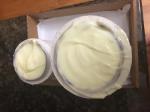Weight measurement versus Cup measurement
by Judith
(Nigeria)
I am new at soap making and don't have a weighing scale yet. I usually draft down my different recipes then use the weighing scale at my place of work to weigh my lye but use cup measurement for my oils at home.
I just came across one of the comments saying "all measurement should be weight measurement not volume."
Does it have a significant difference when using volume measurement? I really want to know.
I have prepared three small batches of soap (310g) and wondered if they could be lye heavy?
I started using one of the soaps and am kind of experiencing dryness and sometimes itchiness.
Could it be the soap?
Answer:
Using weight measurement is very important when it comes to soap making.
One cup of coconut oil is the same size as one cup of sweet almond oil but it is not the same weight. And this is why it is so important to use weight measurements.
The amount of lye you need in your recipe is calculated on the weight of the oil and not the fluid ounces so it is quite possible that your soap could be lye heavy. Especially since you are making very small batches of soap.
The smaller the batch of soap you make, the more accurate your measuring needs to be. There just isn't any room in your super-fat to cover mistakes.
As soon as you are able, I suggest investing in a soap scale. Thankfully, there are very economical ones on the market these days! In the mean time, see if your employer will let you weigh out your oils as well on your work scale.
The dryness and itch could be from either the soap being a bit lye heavy or you could be reacting to one of the ingredients you are using.
Some people are sensitive to different carrier oils and essential oils. To test if you are having a reaction to a carrier oil, rub a small amount of the oil into the inside of your elbow (soft, sensitive spot) and leave it for 24 hours. If you start to experience any redness and itching in the area during that time, you are likely sensitive to the oil. Wash the oil off immediately.
To test essential oils, you will first have to dilute it considerably in a carrier oil that you are sure you are not sensitive to. Then proceed as with the carrier oil test.
Good luck,
Cathy
Comments for Weight measurement versus Cup measurement
|
||
|
||
|
||

